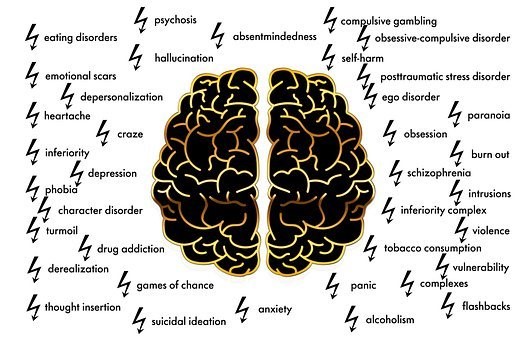Nursing Diagnosis, Care Plan for Schizophrenia-Student Guide
Introduction
Patients with schizophrenia may have trouble distinguishing between what’s real and not real. They often can’t tell the difference between their thoughts, feelings, ideas, memories, and dreams. Some clients with schizophrenia also have problems judging distances or time passages accurately. They may be indecisive about simple decisions like whether to walk one way or another in a room.
This blog post will discuss the potential nursing diagnoses for schizophrenia and provide nursing care plans that nurses can use for this type of client, as a way of educating the nursing students.
This post aims to educate health care students about how to approach these patients with an understanding of their needs. Nurses should understand their role in ensuring that clients can live independently within society while still receiving adequate treatment for their illness.
As you read, keep in mind that our top writers are ready to help in case you get stuck or cannot complete your nursing assignment due to other reasons such as a busy schedule. All you need to is place an order with us!
Disclaimer: The information presented in this article is not medical advice; it is meant to act as a quick guide to nursing students, for learning purposes only, and should not be applied without an approved physician’s consent. Please consult a registered doctor in case you’re looking for medical advice.
What is Schizophrenia?
Schizophrenia is a chronic mental illness characterized by psychotic episodes, delusions and hallucinations. The word schizophrenia comes from the Greek words “schizo”, meaning split and “phrene”, meaning mind. Schizophrenia is a brain disorder that affects how someone feels, thinks, behaves and interacts with others.
Clients with schizophrenia may think they are being threatened by outsiders or being persecuted; this is called the paranoid type. They may hear voices or see things that others don’t hear or see -this is called auditory or visual hallucinations. They may have confused thoughts and speak in strange, confusing ways- this is called disorganized speech. They may not be able to make sense of their feelings, which causes them to feel alone; this is referred to as alogia.
They may also notice tiny things that no one else sees, referred to as hallucinations and delusions.
What Are the Causes for Schizophrenia?
There is no single cause for schizophrenia; various reasons have been identified as being the leading causes for schizophrenia. These potential causes include genetic vulnerability, brain injury, stress and environmental factors like taking drugs like cannabis or cocaine.
The more likely someone is to develop Schizophrenia if they have a blood relative with the disease (genetic tendency). However, not everyone who has a genetic predisposition develops the disease.
Signs and Symptoms of Schizophrenia
The symptoms of Schizophrenia vary from client to client. Some of the common signs are:
1. Confusion – They may have trouble keeping track of things like dates, times, and places. They also can’t form new memories or grasp ideas and concepts. This makes communicating with others very difficult for them.
2. Disturbed Thought Process – They may have trouble with organizing their thoughts. This makes it difficult to follow the flow of a conversation and keep track of what is being said.
3. Emotional Disturbance – Changes in emotion are common; they may feel depressed or anxious, have sudden mood changes, or seem emotionally flat or withdrawn.
4. Unusual Behavior – The behavior of a client with schizophrenia may be unusual. It may range from a complete lack of motivation to being highly agitated and anxious. They may behave in an unexpected way, which can provoke fear or anger.
5. Social withdrawal – They find it hard to interact with other client because of their erratic behaviors. Their inappropriate facial expressions, inappropriate body language, odd mannerisms and lack of eye contact make it hard for them to communicate with others.
6. Physical Movements and Gestures – They may have unusual posture or a stiff way of walking or moving. Some clients may act out in ways that are not appropriate in their situation, while some can’t speak or act at all.
7. Delusions (false beliefs) – A schizophrenia patient may hear voices, see things that aren’t there, or feel that someone is controlling their thoughts. They may believe they have great insight into something even though they think it has no basis in reality (delusion).
8. Hallucinations – The most common form of hallucination is seeing or hearing things that are not there. Someone with schizophrenia may hear voices that tell them what to do or comment on their actions without realizing the source of the voice (auditory hallucinations).
9. Cognitive Problems – The thinking process is disturbed in clients with schizophrenia. They have cognitive problems like very poor memory, trouble focusing and attention span.
10. Psychosis – A client with schizophrenia may have episodes when they are hallucinating or delusional. This can last for a few hours to days at a time (psychosis).
11. Violence towards self or others – A client may harm themselves due to the psychotic symptoms they are experiencing. They might also harm others around them like family, friends etc.
12. Impaired verbal communication- The client may have trouble expressing their thoughts verbally.
13. Disturbed sensory perception- Some clients with schizophrenia may experience a distorted sense of touch, smell, sight or hearing. This can confuse them and others around them; they might believe that these changes are real instead of being a symptom of the disease (hallucinations).


Nursing Diagnosis of Schizophrenia
A nursing diagnosis could be psychosis due to schizophrenia, leading to the care plan of medication management for schizophrenia and appropriate safety precautions.
The following nursing diagnoses are commonly used to diagnose Schizophrenia:
Nursing Diagnosis for Schizophrenia: Disturbed Thought Processes
Ineffective individual problem solving related to disturbances in thought processes (e.g., distortions, illogical thinking)
Nursing Diagnosis for Schizophrenia: Chronic Confusion
Ineffective Coping is related to an inability to tolerate and/or integrate stress due to chronic confusion
Nursing Diagnosis for Schizophrenia: Disturbed Sleep Pattern
Disturbed sleep pattern related to psychotic thoughts at night, including difficulty returning to sleep, frequent awakenings, nightmares, restless sleep, and flashbacks.
Nursing Diagnosis for Schizophrenia: Deficient Knowledge
-Related to insufficient knowledge about specific medication effects, side effects and active ingredients in medications used for the treatment of symptoms of schizophrenia
Nursing Diagnosis for Schizophrenia: Altered Health Maintenance
-Related to insufficient knowledge about the condition and its treatment, diet, nutrition and hydration related to lack of interest in eating.
Nursing Diagnosis for Schizophrenia: Anxiety/Depression Secondary to Schizophrenia
Anxiety relating to the unpredictability of the need for care or the severity of psychotic episodes and treatment side effects- Severe anxiety is seen in individuals having this disease because of the unpredictability of their condition.
Schizophrenia Nursing Diagnosis: Impaired Verbal Communication
-Impaired verbal communication related to positive signs and symptoms or negative symptoms such as catatonic stupor or mutism
-Inability to ask for help or communicate effectively when needed
– Clients with Schizophrenia may have trouble expressing their thoughts verbally and tend to speak very slowly. It is also known as poverty of speech.
Schizophrenia Nursing Diagnosis: Impaired Social Interaction
-Related to the disturbing thought process, difficulty coping with stressors, poor impulse control or judgment problems.
Schizophrenia patients might avoid social interactions due to the paranoid thoughts and hallucinations that may interfere with forming relationships.
Nursing Diagnosis for Schizophrenia: Interrupted Family Process
-Caregivers of individuals with Schizophrenia may experience extreme stress and may feel overwhelmed due to the unpredictable nature of this disease. They also have higher chances of being in abusive relationships.
Nursing Diagnosis for Schizophrenia: Disturbed Sensory Perception
-Related to the signs and symptoms of schizophrenia
A client with this illness might have a perception error about their illness due to which they won’t be able to identify their condition in time.
Schizophrenia Nursing Diagnosis: Self-Concept Deficit
– Relating to being a client with schizophrenia A client might not be able to accept their illness as part of his/her identity, which can lead to depression in time. Their self-esteem and self-confidence will decrease over time, leading to a negative self-image.
-A client might have trouble doing basic activities of daily living due to their abnormal behavior, which can lead to neglecting themselves and their hygiene, being involved in risky or harmful behaviors, and withdrawing from social interactions.
-Sleep disturbance related to the hallucinations and delusions experienced during waking or sleeping hours – The hallucinating and delusional symptoms of schizophrenia involve anxiety, fear, or terror, which keeps the client from getting adequate sleep.
Schizophrenia Nursing Care Plans
The nurse may develop the following schizophrenia nursing care plans based on the clinical manifestations exhibited by the patient. Note that nursing care may vary from one client to another depending upon their condition and response to treatment.
Schizophrenia Nursing Care Plan: Hallucinations
-Review patient record with the patient to obtain history and current symptoms.
-Provide reassurance to the patient that his/her condition is not a character flaw, nor is it an indication of punishment by God.
– Help schizophrenia patients to recognize that treatment options exist with which he/she can lead a productive life.
-Educate the patient on coping mechanisms to manage hallucinations and other signs and symptoms.
-Try to alleviate the patient’s fears by providing reassurance, empathy and validation of his/her worth as a client in spite of having an illness. Often clients who have schizophrenia will feel they are responsible for their disease or being punished. To help the patient overcome a poor self-concept, we need not treat his/her odd beliefs as facts.
-The patient may be encouraged to be listening to music, watching TV or reading to distract the self from the hallucinations.
Nursing Interventions Rationale:
The purpose of carrying out this intervention is to give the patient with schizophrenia an opportunity to discuss his/her experiences of hallucinations and delusions in a safe manner enabling them to understand that their feelings are normal.
Schizophrenia Nursing Care Plan: Delusions
-Review patient record, history and current symptoms with the patient. Assess the severity of delusions according to rating scales.
-Assess the impact of delusions on the patient and his/her family. Identify factors that may contribute to his/her poor social interaction and self-care.
-Monitor the patients closely for behavioral changes, depression and suicidal ideations. Report to the physician immediately if any of these are present.
-Encourage the patient to participate in activities that will promote self-care, social interactions and feelings of mastery over his/her illness.
Schizophrenia Nursing Care Plan: Disturbed Thought Processes
– Review hospital and medical records with the patient to obtain additional history.
– Develop rapport with the patient, listen attentively, and provide verbal reinforcement for the patient’s contribution to the conversation.
– Providing reassurance about their illness may offer comfort and reduce fears of being punished or persecuted. This may be achieved by providing an explanation for their illness, teaching them realistic expectations about the effects of medication and helping the patient to correct his/her own incorrect beliefs.
-Help the patient identify and reinforce positive behaviors through praise, encouragement, modelling or rewards for these behaviors. Praise statements include: “You did a great job,” “I’m impressed you did that,” “I like the way you did that” Encourage by asking questions until the patient volunteers something. Model age-appropriate behaviors for the patient. Rewards can be points on a chart that lead to small amounts of money, movie passes or tickets to an event, etc.
-The nurse should provide opportunities throughout the day for pleasure and leisure activities. At least 1 hour of external stimulation per day is encouraged, such as music, radio, television, reading, etc.
-Encourage the patient to verbalize his/her feelings related to the illness.
-The active listening technique might be used during a one-on-one session with the nurse.
-Use therapeutic communication skills such as reflecting the patient’s feelings or thoughts by paraphrasing what was said in greater detail, acknowledging the feeling and then validating it.
Therapeutic Communication Skills: Reflecting – Paraphrasing – Validation – Empathy (there are many other therapeutic communication skills which you can learn in a nursing course)
-Encourage the patient to join peer groups and other social groups for support.
-The nurse might use parallel statements when responding to the patient’s illogical thoughts or hallucinations.
Schizophrenia Nursing Care Plan-Impaired Verbal Communication
-Review hospital and medical records with the patient to obtain additional history.
– Ask questions that specifically relate to the pertinent areas of concern with regard to impaired verbal communication. For example, asking about his/her voice in terms of “sounds” or “how it feels”.
– Recognize that individuals who have experienced impaired verbal communication may be fearful or embarrassed about vocalizing their concerns.
-Question the patient’s ability to discuss a scheduled medical procedure when they have impaired verbal communication. This might stem from childhood experiences when being told that it is not “good” for them to express their feelings verbally or exhibiting negative behaviors such as crying, screaming, yelling, etc.
-Allow the patient to verbalize his/her thoughts and feelings in a way that is comfortable for him/her, whether it be through gestures or writing them down on paper.
-Provide privacy when discussing sensitive information with the patient.
-Be aware of your own emotions during a conversation about this topic. It is important to express empathy and maintain eye contact during interactions with the patient.
-If the patient has an impaired ability to vocalize his/her needs, offer alternative ways for that client to communicate, such as by writing things down or using a communication board (picture exchange cards).
-Model empathetic responses when listening to a client with impaired verbal communication, including using open-ended questions, paraphrasing and reflecting feelings.
-Explain a procedure and its purpose to the patient, using age-appropriate terms. For example, instead of saying, “You are going to receive an injection,” explain what the medication is used for: “I’m going to give you this injection so that you can feel better.”
– Encourage families or significant others with whom the patient has a close relationship to meet the nurse.
Nursing Interventions rationale:
The schizophrenia patients will learn how to express feelings in a healthy way. The nurse will help the patient regain his/her ability to communicate verbally, a sense of control over the illness or procedures, and provide encouragement for expressing thoughts and feelings.
Schizophrenia Nursing Care Plan: Anxiety
-Monitor the patient’s level of depression by asking him/her about thoughts, feelings and behavior. -Identify that because these patients are usually preoccupied with their own physical sensations, they may neglect cliental hygiene (i.e., not bathing or shaving) and appearance. You can also note the presence of poor grooming to identify the patient’s mood. -Identify patients with conditions that might cause depression (i.e., hearing impairment, difficulty swallowing, and incontinence).
Refer for group or individual therapy to help patients deal with the underlying cause of their anxiety, including living situation or relationship issues. Therapy can also help them address behaviors such as smoking and overeating.
Nursing Interventions Rationale:
Schizophrenia patients will learn to identify triggers for anxiety and depression, which in turn helps them avoid acting out. This will help improve their quality of life. The patient will improve their quality of life by improving their self-esteem, motivation and they’ll become more independent after the diagnosis.
Schizophrenia Nursing Care Plan: Depression Secondary to Schizophrenia
-Use therapeutic activities such as art, music or pet therapy to provide emotional support. These activities promote communication and interaction between the patient and you as a nurse.
Encourage patients with depression to be physically active by recommending activities such as walking outdoors in familiar places or engaging in physical therapy exercises (i.e., stretching).
-Encourage them to maintain their normal routines and responsibilities. Help the patient set realistic goals for self-care.
– Encourage them to eat meals at regular times, avoiding rapid or significant weight fluctuations. You can also recommend that they limit their intake of caffeine and alcohol.
Give the patient an anti-depressant (selective serotonin reuptake inhibitor, SSRI) or an antipsychotic medication. These drugs will improve the patient’s mood, behavior and cognition. For patients who are not receiving antipsychotic medications, monitor responses to nonpharmacological interventions. If they do not improve, consider the use of an anticonvulsant or electroconvulsive therapy (ECT).
Rationale:
The patient will learn how to deal with their sadness/depression by learning activities that can help, such as art and music therapy, walking in nature, physical therapy and animal therapy. They will be able to make friends with other patients causing a feeling of comfort and trust. The patient will feel relaxed when being active will cause them to let go of their stress. Eating at regular times and not too much intake of alcohol and caffeine can help the patient to feel better. The patient will be less depressed, their cognitions will be improved, and they will be more sociable when going through medications given by a nurse and therapies that have been suggested.
Schizophrenia Nursing Care Plan: Impaired Social Interaction and Communication
– Gain an understanding of the patient’s social skills, coping mechanisms and daily activities. You can learn about the patient’s usual methods of communicating with others so as to better assess their ability in this area. For example, ask him/her how he/she normally talks to friends or family members at home.
– Seek ways to help the patient build new skills for social interaction. In group and individual therapy sessions, teach them how to identify topics that interest them and share this information with others. You may also identify areas in which they have strong opinions or issues (i.e., education, politics) and encourage them to discuss and debate these issues with others. You can also teach patients how to use nonverbal communication (i.e., gestures, facial expressions) when they have trouble expressing themselves verbally.
– If the patient has difficulty staying on topic or initiating conversations, suggest that they ask open-ended questions of others to keep the conversation flowing. For example, you can teach the patient to ask questions such as “Tell me about your day” or “How was your weekend?”
– If the patient has problems paying attention and staying on task during group sessions, try one-on-one counselling instead of group therapy.
– Teaching patients to identify topics that interest them can help you develop shared interests. You might consider using a conversational guide (i.e., questions, discussion starters) which will be helpful to both of you in initiating conversation or small-group discussions.
– Encourage the patient to interpret nonverbal communication when they are having difficulty expressing themselves verbally. For example, teach them what facial expressions or body language means (i.e., happy, sad, angry) to be able to respond appropriately in any given social situation. You can do this by reviewing media clips (i.e., movies, TV shows) that demonstrate how clients act in various situations and teach the patient to interpret this nonverbal communication.
– Think about other strategies you can use when teaching patients about nonverbal communication, such as visual aids or using pictures or cards with different faces on each card so they may choose which face they think matches their feelings. You might also teach them about body language by having them take turns playing the part of a specific character in a movie or TV show and having them describe how they’re feeling using body movements. Another example might be to have the patient act out various emotions on stage and ask others to guess what emotion they are attempting to portray.
Schizophrenia Nursing Care Plan: Medication Management for Schizophrenia
Medications for schizophrenia are frequently classified as neuroleptic drugs, which help regulate dopamine and serotonin within the patient’s brain. The goal of medication management is to keep symptoms at an “acceptable” level for a patient to continue with their everyday life. In addition, medication management can also help alleviate the symptoms of paranoia and hallucinations and stress reduction.
-Schizophrenia medications are administered in the following ways: Oral, IM, Intravenous or even intramuscular. If the patient is a young child, they may be more comfortable taking their medication via the liquid form.
-Medications should be taken daily for them to be effective.
-Inform the patient that medications may have unpleasant side effects, including appetite changes, weight gain, drowsiness or dizziness, dry mouth etc.
-Ask the patient if they are taking other meds as schizophrenia drugs tend to interfere with other ones.
-Be alert for potential drug interactions and advise patients of what they are taking.
Nursing Interventions Rationale:
Medication will help chemical alterations within the brain that help with the prevention of symptoms, and improve cognition or functionality in everyday life.
Summary
The key points that one needs to know about this disease are:
1. Schizophrenia is a brain disorder-
The exact cause of the disease is unknown, but it’s suspected that it has something to do with chemicals in the brain. Mental illness, genetic factors, substance abuse and stressful life events may trigger the disorder.
2. Symptoms can be controlled-
Using medication, psychosocial therapy, or a combination of both helps control symptoms of schizophrenia-like hallucinations, delusions etc.
3. Medication is the primary treatment-
For treating schizophrenia patients who are experiencing hallucinations or delusions, medication and therapy work best. However, there isn’t one specific medication that works for everyone with schizophrenia, so it’s crucial to find the right combination of medications for a client.
4. Most clients with schizophrenia recover-
It might take years for a client with schizophrenia to recover completely, but most do get better. If a client receives proper treatment and continuous care, they can lead an everyday life.
Schizophrenia is not simply a mental disorder; it’s more than that, and the symptoms are also not the same in everyone suffering from this disease. It’s essential to recognize that some clients may need more care or support. It’s also crucial for the family and friends of this client to understand and help them in whatever way they can.







